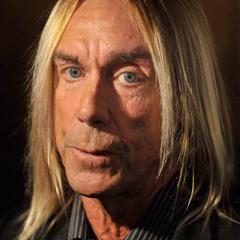歌手:iggy pop
2012-12-14、歌谱控、人气:(载入中...)
- 姓名:iggy pop
- 性别:男
- 别名:暂无
- 国籍:欧美
- 语言:暂无
- 出生地:暂无
- 生日:暂无
- 星座:暂无
- 身高:暂无
- 体重:暂无
iggy pop简介:1947年4月21日,在美国密歇根州底特律市的一个小镇上,“朋克之父”——Iggy Pop(伊基·波普,原名是詹姆斯·朱厄尔·奥尔斯德伯格)出生了,他的父亲是一名英国移民,母亲则是一个本地人。在The Doors乐队的影响下,Iggy与来自Chosen Few乐队的Ron Asheton共同成立了名为Psychedelic Stooges的乐队。Iggy做新乐队的吉他手和主唱,Asheton出任贝斯手,不久后Asheton的兄弟Scott成为了乐队的鼓手。1967年的万圣节期间,Psychedelic Stooges乐队推出了他们首张专辑。70年代末期兴起的朋克浪潮吸引了Iggy Pop,1977年,Bowie和The Stooges来到柏林录制了专辑《The Idiot》以及《Lust For Life》,而Bowie则出任乐队的键盘手。其中歌曲“Nightclubbing”、 “The Passenger”以及“China Girl”被誉为The Stooges的柏林三部曲。这两张颇具流行特色的专辑意外地成为了他事业最辉煌的顶点,《The Idiot》最终排名美国排行榜第27位,而莱蒙斯最好的成绩也不过才40多名。 不久,他开始改做硬摇滚,而此时朋克摇滚才刚刚红火起来,1978年的现场专辑《TV Eye》虽然成绩平平,却使他成为最早涉足硬摇滚的朋克之一。Iggy Pop一直致力于发展自己的事业,虽然没有固定的乐队,但他还是执著地坚持了一贯的朋克精神。这段时间,他共推出了数张专辑,无一不是1979年硬摇滚专辑《New Values》的标准翻版,这段时间是Iggy Pop历史上最多产的阶段,尤以1982年专辑《Zombie》为最,他几乎包括了Iggy Pop单飞后所有的重要作品。专辑发行后,Iggy Pop淡出摇滚界,在离开的这段时间内,Iggy戒除了毒瘾而且结婚了。1985年Iggy出山,与Steve Jones乐队合作发行了一系列专辑。直到1986年才迟迟推出专辑《Blah Blah Blah》。这张硬摇滚专辑虽然没有什么作为,但是他再次开始了Iggy Pop事业,确保了Iggy Pop1990年专辑《Brick By Brick》的巨大成功。《Brick By Brick》成为他事业上最成功的作品,不仅诞生了他第一支Top40单曲“Candy”,而且取得了巨大的商业成绩。 进入90年代后,Iggy Pop开始走下坡路,1993年和1996年,他先后完成朋克硬摇滚专辑《American Caesar》和《Naughty Little Doggy》,成绩一般。1999年,最新专辑《Avenue B》上市,这张专辑一改一贯尖锐的朋克态度,以民谣的面孔出现在世人面前。或许,他真的老了70年代末期Iggy与Arista唱片签约,与Glen Matlock以及Ivan Kral乐队合作发行了系列专辑。1982Iggy离开摇滚乐坛,开始着手编写自传。 尽管Iggy Pop以及The Stooges已经老去,但我们永远不能忘记他们对现在以至将来摇滚乐的深远影响。 There's a reason why many consider Iggy Pop the godfather of punk — every single punk band of the past and present has either knowingly or unknowingly borrowed a thing or two from Pop and his late-'60s/early-'70s band, the Stooges. Born on April 21, 1947, in Muskegon, MI, James Newell Osterberg was raised by his parents (his father was an English teacher) in a trailer park close to Ann Arbor, in nearby Ypsilanti. Intrigued by rock & roll (as well as such non-musical, monotonous, and mechanical sounds as his father's electric razor and the local automobile assembly plants in Detroit), Osterberg began playing drums and formed his first band, the Iguanas, in the early '60s. Via the Rolling Stones, Osterberg discovered the blues, forming a similarly styled outfit, called the Prime Movers, upon graduating from high school in 1965. When a brief stint at the University of Michigan didn't work out, Osterberg moved to Chicago, playing drums alongside bluesmen.But his true love was still rock & roll and shortly after returning to Ann Arbor, Osterberg decided to form a rock band, but this time, he would leave the drums behind and be the frontman (inspired by the Velvet Underground's Lou Reed and the Doors' Jim Morrison). He tried to find the right musicians who shared his same musical vision: to create a band whose music would be primordial, sexually charged, aggressive, and repetitive (using his early electric razor/car plant memories for reference). In 1967, he hooked up with an old acquaintance from his high school days, guitarist Ron Asheton, who also brought along his drummer brother Scott and bassist Dave Alexander, forming the Psychedelic Stooges. Although it would take a while for their sound to gel — they experimented with such non-traditional instruments as empty oil drums, vacuums, and other objects before retuning to their respective instruments — the group fit in perfectly with such other high-energy Detroit bands as the MC5, becoming a local attraction. It was around this time that the group shortened their name to the Stooges, and Osterberg changed his stage name to Iggy Pop. With the name change, Pop became a man possessed on-stage — going into the crowd nightly to confront members of the audience and working himself into such a frenzy that he would be bleeding by the end of the night from various nicks and scratches. Elektra Records signed the quartet in 1968, issuing their self-titled debut a year later and a follow-up, Fun House, in 1970. Although both records sold poorly upon release, both have become rock classics and can be pointed to as the official beginning of what would become known as punk rock. The group was dropped from their record company in 1971 due to the public's disinterest and the group's growing addictions to hard drugs (and additionally in Pop's case, continuous death-defying acts), leading to the group's breakup the same year. But Stooges fan David Bowie tracked down Pop and convinced the newly clean and sober singer to restart his career. Pop enlisted guitarist James Williamson (who was briefly a second guitarist for the Stooges before their breakup) and, after the pair signed to Bowie's Mainman management company and relocated to England, eventually reunited with the Asheton brothers (with Ron moving from the six-string to the bass). Signed by Columbia Records and hoping to follow in Bowie's footsteps toward a major commercial breakthrough, the Stooges penned another punk classic, the brutally explosive Raw Power. Pop's plan for the Stooges' third release overall would be to create a record that would be so over the top sonically that it would actually hurt you when it poured out of the speakers. Although it may not have been that extreme, it came pretty close (with Bowie signed on as the producer), but yet again, the album sank without a trace. By 1974, Pop and most of the Stooges were strung out again on drugs, and with their star fading, the band called it quits for a second (and final) time. After spending a brief spell homeless on the streets of Hollywood (during which time there was an unsuccessful attempt to form a band with Pop and former Doors keyboardist Ray Manzarek), Pop checked himself into the Neuropsychiatric Institute in Los Angeles. During his stay at the hospital, Pop made an attempt at writing and recording some new tunes with Williamson, but when no labels expressed interest, Pop and Williamson went their separate ways as well. (Completed demos of the sessions would surface on the Kill City release in 1977; they would also appear on the 2005 compilation Penetration, which also featured a number of widely circulated demos, outtakes, and alternate mixes from the Raw Power sessions.) During his hospital stay, another old friend came to visit him: David Bowie. Bowie (whose career was still in high gear) offered to take Pop on the road with him during his tour in support of Station to Station. The pair got along so well that they both moved to Berlin in late 1976, during which time Bowie helped Pop secure a solo record deal with RCA. Bowie was interested in European electronic rock (Kraftwerk, Can, etc.) and admitted later that he used Pop as a musical guinea pig on such releases as The Idiot and Lust for Life (both issued in 1977 and produced/co-written by Bowie). Both albums sold better than hi









